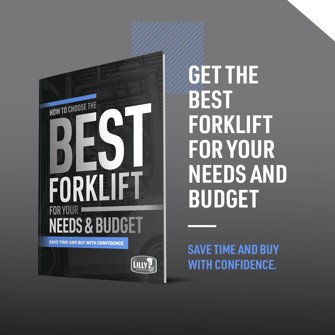5 min read
How to Choose the Best Electric Pallet Jack for Your Warehouse
John Wofford
Nov 16, 2021 8:00:00 PM
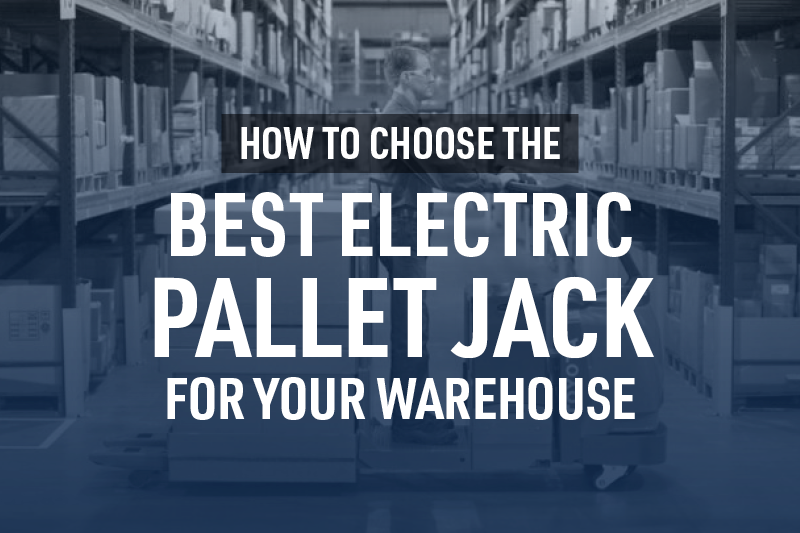
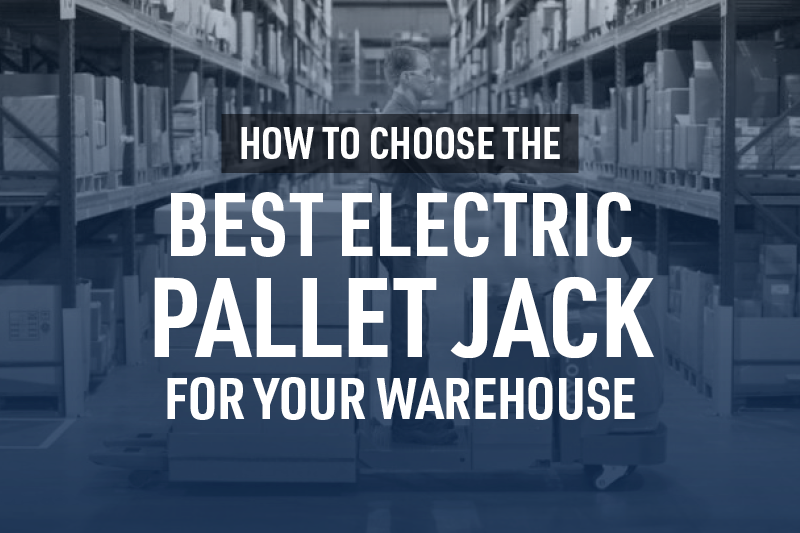
It goes without saying that not every warehouse is the same. Some need full-sized forklifts. Others need only hand jacks.
But what if your warehouse needs something in-between?
Enter the electric pallet jack.
Why Electric Pallet Jacks Might Be Right for You
An electric pallet jack, or “EPJ,” is a smart choice for many warehouses for a few reasons. Compared to full-sized, sit-down forklifts, they save you time and money by being:
- Cheaper to purchase
- Easier to maintain
- More maneuverable
- Smaller and easier to store
But choosing an electric pallet jack means more than just knowing the load capacity. Different jacks have different features to suit your storage and organization goals.
In this article, we’ll help you understand how to choose the right electric pallet jack for your needs. We’ll cover:
- Different types of pallet jacks
- Three things to look for when choosing a pallet jack
- Three specific Toyota models and their uses
How Different Types of Pallet Jacks Meet Different Needs
Before you can choose the right pallet jack, it helps to understand their function. Please keep in mind that pallet jacks (and stackers) are considered a type of forklift per OSHA standards and require a forklift certification to operate.
Pallet jacks are categorized in a few simple ways, usually by their power source and their mode of operation.
Manual vs. Electric Pallet Jacks
Manual pallet jacks, also known as hand jacks, require the user to pump the lever to raise the jack. These are the most affordable option. They rely on a hydraulic system plus the force applied by the user. As a result, they’re ideal for light-duty work rather than consistently moving larger, heavier loads.
The middle category of “semi-powered” or “semi-electric” are manual pallet jacks with an electric drive function. The user is still required to pump the lever to raise the jack but moving the load is easier thanks to a battery-operated motor.
Electric pallet jacks and stackers run on battery power both to lift the load and to move it. They must be regularly recharged to operate.
Pallet Jacks vs. Stackers
Pallet jacks are designed to pick the load up off the ground so it can be moved. Stackers more closely resemble forklifts because they have a similar lifting mast that can lower and raise its forks (as high as eleven feet on some models). We will focus mostly on pallet jacks going forward.
Walkies vs. Riders
To move loads across short distances, we recommend a walkie jack. As the name implies, you guide the machine around by walking beside or behind it. For longer distances, you can opt for a rider, instead, which offers its user the ability to stand on it while moving loads. Riders are either available in center-controlled or end-controlled models, referring to where the user stands while operating the machine.
Once you have a better idea of what kind of forklift fits your needs, you can take a closer look at these three things to help you make the right decision.
3 Things to Look For in an Electric Pallet Jack or Stacker
- Load Capacity
- Fork Length
- Battery
Load Capacity
Each electric pallet jack or stacker has a designated capacity that might range from 2,000 to 8,000 pounds. Pushing a jack beyond its limit could damage the jack as well as the product the user was attempting to load. In addition to putting warehouse personnel in danger, this also means that your equipment, if broken, will be unusable until repair.
Knowing the weight of your loads and the distance they need to travel should have the biggest impact on the type of model you choose.
Fork Length
That being said, choosing the right fork length is just as important. Forks that are too long or too short are unsafe for operation. In addition to knowing fork length with respect to your pallet sizes, you’ll also have to know how well those forks will be able to maneuver around your space. If you’re considering a stacker, keep in mind that the maximum height the forks reach can vary between models.
Battery
Although the type of battery might be the last thing on your mind, there are two different options - wet-cell batteries and lithium-ion batteries. Traditionally, units come with a wet-cell battery that, although slightly cheaper, does require maintenance. On the other hand, lithium-ion batteries are only slightly more expensive but require no maintenance, hold charges longer, and typically outlive the use of their pallet jacks.
Which of These Electric Pallet Jacks is Right For You?
Toyota Electric Walkie Pallet Jack
Capacity: up to 4,500 lbs
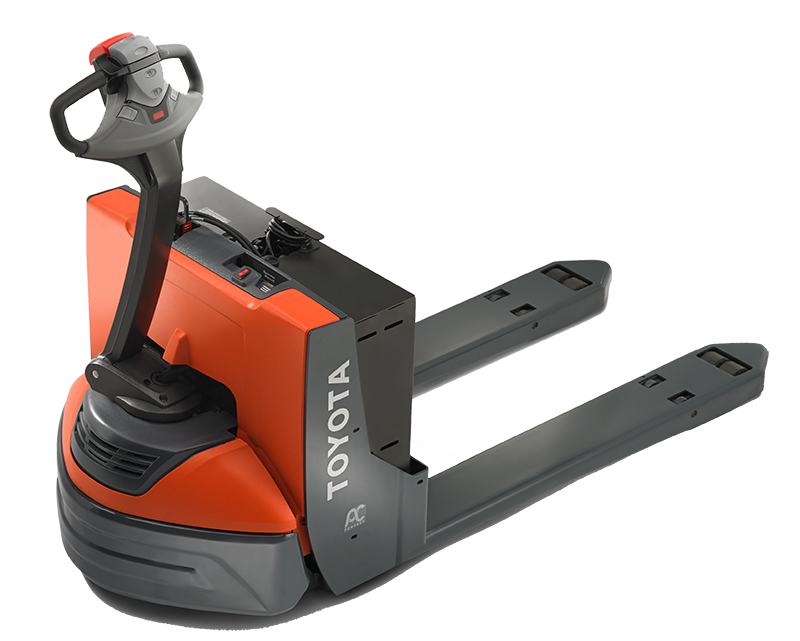
Versatile and highly maneuverable, this electric walkie model is easy-to-use and easy on your budget. It’s ideal for middle distances and a smart option for loading and unloading trailers.
You can opt for the integrated fork scales, allowing you to measure loads without using a separate scale. It has excellent run time on a single charge and functions as a more compact option, making it easier to store when not in use. It also has a unique “click-to-creep” feature that allows its user to easily push the jack at a safe, steady speed not exceeding one mile per hour.
The businesses that might benefit most from this kind of jack are those in the beverage and frozen goods industries.
Toyota Large Electric Walkie Pallet Jack
Capacity: 6,000-8,000 lbs
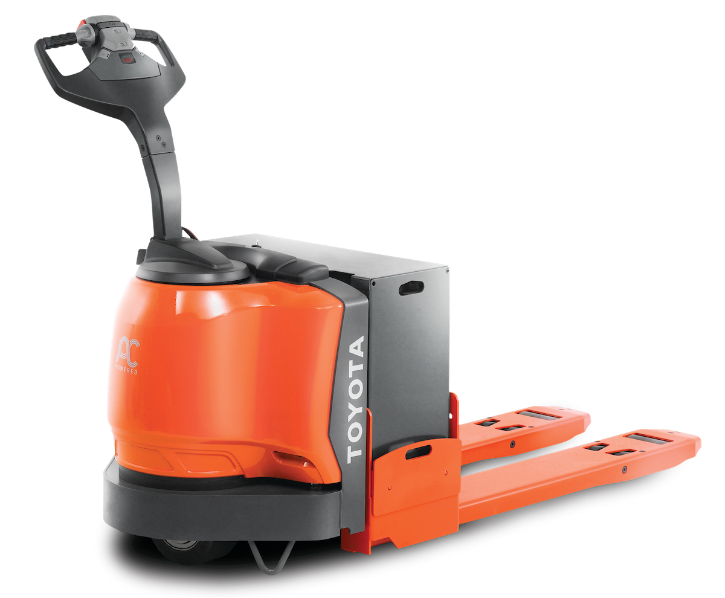
Bigger, stronger, and more robust than the standard walkie offering, this electric pallet jack is designed to carry heavier loads. This is better suited to the general warehouse and general manufacturing industries.
With built-in diagnostics and an AC drive system, this jack is designed to enhance productivity with fast responses to commands and greater precision. Although larger than the first option, it remains tremendously maneuverable with a 67.4-inch turning radius and a regenerative braking system.
Toyota Center-Controlled Rider Electric Pallet Jack
Capacity: 6,000-8,000 lbs
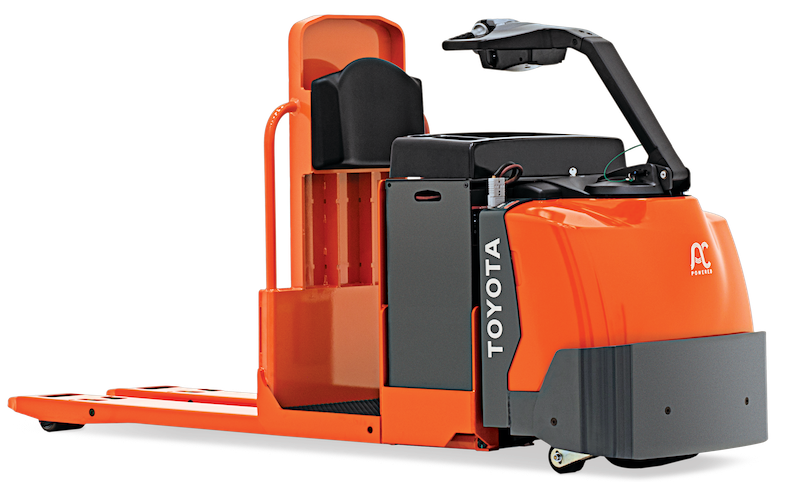
A center-controlled rider model is a great option for longer trips with heavier loads across the warehouse floor. The center compartment is designed to keep the user comfortable throughout extensive use.
The machine is easy to service, and its AC power system is just as responsive as the other two options. It’s also the ideal size to function as a ground-level order picker, complete with the 96” fork option.
Tora-Max Electric Walkie Stacker
Capacity: up to 2,600 lbs
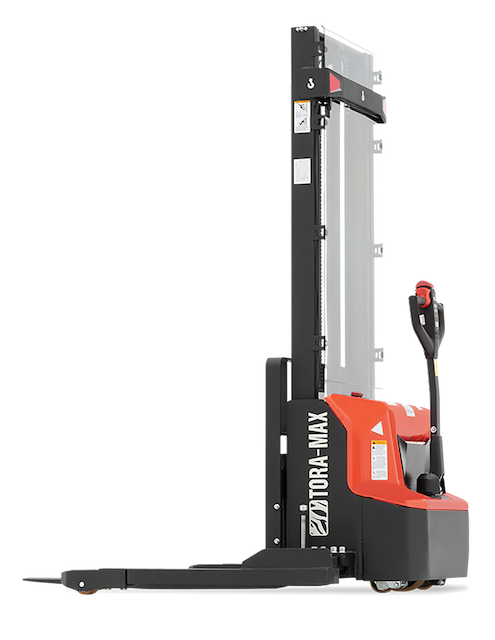
The Tora-Max Walkie Stacker is one of the latest additions to the Toyota family. This highly maneuverable electric stacker has 6 available mast configurations which can lift loads up to 140 inches. This makes it perfect for light-duty applications like the food and beverage industries.
It comes with a 24-volt lithium-ion battery. This maintenance-free battery provides longer run times than competing models. The stacker also makes use of regenerative braking to extend uptime. Additionally, the onboard charger plugs into a standard wall outlet to simplify charging.
Finally, the Tora-Max Electric Walkie Stacker features easy-to-operate, ergonomic controls to enhance operator comfort.
Plus, New Toyota Models Are on the Horizon!
While this is only a small sample of the available models, Toyota has very recently announced that new options will be available soon. If you’d like to learn more about, for example, their new low-level order picker, get in touch with us today.
Looking for More Electric Pallet Jack or Forklift Buying Tips?
At the Lilly Company, we’re experts in helping you find and choose the right pallet jack, stacker, or forklift for your needs. We are an authorized forklift dealer for Toyota, Clark, and Linde, serving customers throughout Alabama, Mississippi, Tennessee, and eastern Arkansas.
Contact a forklift expert at The Lilly Company online or by phone at 800-238-3006 with any questions you have, or visit us at one of our 13 locations across the Mid-South:
- Arkansas - Jonesboro
- Alabama - Dothan, Irondale, Mobile, and Montgomery
- Mississippi - Tupelo, and Richland
- Tennessee - Jackson and Memphis
If you’re not ready to connect with an equipment expert, start with our free guide: How To Choose the Best Forklift for Your Needs and Budget. Save time and buy with confidence when you know:
- Key questions to help you avoid purchasing the wrong forklift
- When to choose an electric vs. internal combustion forklift
- What tires and attachments you may need
- How to get the maximum forklift for your money
- Important questions buyers forget to ask
Further Reading:
Posts by Tag
- Forklift (61)
- Forklift Service (19)
- Electric Forklifts (16)
- Forklift Safety (14)
- Forklift Attachments (12)
- Toyota Forklifts (12)
- Warehouse Planning (10)
- Parts (9)
- Warehouse Automation (8)
- Clark Forklifts (7)
- Loading Docks (7)
- Material Handling Education (7)
- Pallet Racking (7)
- Customer Solutions (6)
- Forklift Batteries (6)
- Forklift Rental (6)
- Purchasing Options (6)
- Aerial Equipment (5)
- Heavy Equipment (5)
- Forklift Accessories (4)
- Forklift Fleet Management (4)
- Forklift Tires (4)
- Forklift Training (4)
- Products (4)
- Utility Vehicles (4)
- Yard Spotter Trucks (4)
- Linde (3)
- Pallet Jacks (3)
- Specialty Forklifts (3)
- Used Equipment (3)
- IC Forklifts (2)
- Manitou (2)
- Warehouse Doors (2)
- COMBiLift (1)
- Custom Shop (1)
- Forklift Brakes (1)
- Forklift Warranty (1)
- Gehl (1)
- Komatsu (1)
- Product Review (1)
- Recruitment (1)











